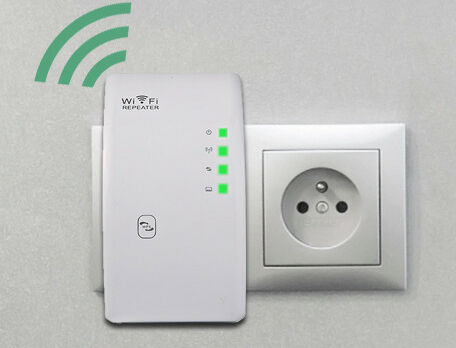Does Wi-Fi Extender Have Radiation?
Wi-Fi extenders are devices that are used to increase the range and strength of a Wi-Fi signal. While they are beneficial for connecting to the internet in areas with poor signal strength, there is a concern about radiation levels created by these devices. This article will explore the potential for radiation emitted from Wi-Fi extenders and what can be done to reduce the risk of radiation exposure.
Definition and Overview of Wi-Fi Extenders
Wi-Fi extenders are devices used to boost the signal strength of a wireless network. They are also commonly known as repeaters, repeater bridges, or wireless range extenders. Wi-Fi extenders are used to increase the range of a wireless network by amplifying the existing signal. This is done by connecting the extender to an existing router or access point via an Ethernet cable, and then broadcasting a new signal. As the signal is rebroadcasted, the original signal is amplified, allowing for a greater range of coverage. This is beneficial for people who have large homes or offices that may have poor wireless coverage, as well as people who need to connect to wireless networks that are far away. When it comes to radiation, Wi-Fi extenders are considered relatively safe. They emit the same type of radiation as wireless routers, but at a much lower level, making them safe for everyday use.
Potential Health Effects of Wi-Fi Radiation
As technology continues to evolve, radiofrequency (RF) radiation from Wi-Fi extenders has become increasingly prevalent in our homes and workplaces. While Wi-Fi extenders are convenient and can provide access to high-speed internet, they also have the potential to emit radiation. This radiation can have an effect on our health, but the question is, how much of an effect?
In this blog, we will discuss the potential health effects of Wi-Fi radiation and how to mitigate them. We will also provide a brief overview of the different types of radiation associated with Wi-Fi extenders and how they can affect our health. By the end, we will have a better understanding of the potential risks of Wi-Fi radiation and how to reduce them.
The most common type of radiation associated with Wi-Fi extenders is radiofrequency radiation. This type of radiation is non-ionizing, meaning it does not have enough energy to change the molecular structure of cells or molecules. However, studies have shown that long-term exposure to RF radiation can have an effect on our health, including an increased risk of cancer, headaches, fatigue, dizziness, and memory loss.
Fortunately, there are steps we can take to reduce our exposure to Wi-Fi radiation. This includes limiting the amount of time we spend on our devices, using a wired connection rather than Wi-Fi, and keeping our devices away from our bodies. Additionally, we should make sure that our Wi-Fi extenders are properly shielded from RF radiation so they don’t emit too much.
Overall, Wi-Fi radiation has the potential to affect our health. However, by taking the appropriate steps we can reduce our exposure and minimize the risks. Remember, knowledge is power, so make sure you’re informed about the potential health effects of Wi-Fi radiation and how to protect yourself.
Wi-Fi Extender Radiation Levels
Are you concerned about the radiation levels of your Wi-Fi extender? You’re not alone. Wi-Fi extenders are designed to boost the range of your Wi-Fi network, but they also emit radiation. The good news is that Wi-Fi extenders produce low levels of radiation that are unlikely to cause harm.
When a Wi-Fi signal is picked up by a device, it is converted into electrical energy. This energy can emit electromagnetic radiation. Wi-Fi extenders, just like other wireless devices, emit radiofrequency radiation or RF radiation. This radiation is a type of low-level, non-ionizing radiation.
The radiation levels emitted by Wi-Fi extenders are low. In fact, the radiation levels emitted by Wi-Fi extenders are far lower than those emitted by mobile phones and other wireless devices. This means that using a Wi-Fi extender is unlikely to cause any harm.
However, it is still important to be aware of the radiation levels emitted by your Wi-Fi extender. You should also be aware of any potential health risks associated with the use of Wi-Fi extenders. The best way to do this is to consult with a professional to determine the exact radiation levels of your Wi-Fi extender.
Overall, Wi-Fi extenders produce low levels of radiation that are unlikely to cause any harm. However, it is important to be aware of the radiation levels emitted by Wi-Fi extenders and any potential health risks associated with their use. Consulting with a professional is the best way to determine the exact radiation levels of your Wi-Fi extender.
Steps to Reduce Wi-Fi Extender Radiation Exposure
Wi-Fi extenders are becoming increasingly popular as more and more people are connecting to the internet via wireless networks. But with this convenience comes the risk of radiation exposure. While the radiation emitted by Wi-Fi extenders is generally considered safe, it is important to be aware of the potential risks and take steps to reduce exposure.
The most important way to reduce radiation exposure from Wi-Fi extenders is to limit the time spent in close proximity to the device. It is also important to keep the extender away from the body, and to ensure that the signal is not obstructed by walls or furniture. Additionally, it is best to position the extender as far away from the user as possible. This will help to reduce radiation levels.
It is also helpful to use an antenna to redirect the signal away from the user. This can reduce the amount of radiation that is emitted. Additionally, users should consider using a Wi-Fi extender with a lower frequency, as this will reduce the amount of radiation emitted.
Finally, users should consider using a Wi-Fi extender with a radiation shield. These shields are designed to absorb and diffuse radiation, making them a great way to reduce radiation exposure.
By following these steps, users can ensure that radiation levels from Wi-Fi extenders are kept to a minimum. Doing so will help to limit potential health risks and ensure that the user is able to enjoy the benefits of wireless internet without worrying about radiation exposure.
Wired Network Connections
are Safer
As the world has increasingly become more connected, so have the worries that come with the potential health risks associated with the technology we all use every day. Wi-Fi extenders are no exception, with concerns over the radiation they might emit, and whether or not they are safe to use. To answer this question, it’s important to look into the type of radiation emitted and how it compares to other forms of radiation.
While Wi-Fi extenders do emit a form of radiation, it is non-ionizing and is considered to be safe. This type of radiation is much less powerful than other forms of radiation, such as X-rays and ultraviolet radiation, and has not been linked to any long-term health risks. However, if you are still concerned about radiation, there is an even safer option: wired network connections.
Unlike Wi-Fi, wired network connections do not emit any type of radiation. This makes them a much safer option, especially for those who are worried about potential health risks. Additionally, wired connections provide a much more reliable and higher-speed connection than Wi-Fi. As such, they are ideal for those who need a fast and secure connection for gaming, streaming, or other activities that require a reliable connection.
Overall, while Wi-Fi extenders may be safe, it is worth considering a wired connection if you’re concerned about radiation. Wired connections are safer and often provide a better connection, making them the ideal choice for those who want to stay connected without worrying about potential health risks.
Future Developments in Wi-Fi Extender Technology
The world of Wi-Fi extender technology is rapidly evolving, and new advancements are being made every day. Wi-Fi extender devices are becoming increasingly popular, and as a result, the technology is becoming more sophisticated and effective. Recent developments in Wi-Fi extender technology include the use of beamforming, which allows the device to direct its signal to the user, providing a more reliable connection. Additionally, Wi-Fi extender technology is being developed to provide improved signal penetration, allowing the signal to reach further than ever before.
The radiation associated with Wi-Fi extender technology is a valid concern, but most experts agree that the levels of radiation emitted by Wi-Fi extenders are far below the levels considered to be dangerous. Additionally, the radiation emitted by extenders is of a non-ionizing type, meaning it is not capable of causing any harm. As Wi-Fi extender technology continues to evolve, more research will be conducted to ensure that radiation levels remain safe.
In conclusion, Wi-Fi extender technology is continuing to improve, and as a result, more people are taking advantage of its many benefits. The radiation associated with Wi-Fi extender technology is minimal, and the technology is becoming more sophisticated and effective every day. With the right extender, users can enjoy a reliable and secure Wi-Fi connection with no worry of radiation.
FAQs About the Does Wi-Fi Extender Have Radiation?
1. Is a Wi-Fi extender safe to use?
Yes, Wi-Fi extenders are considered safe to use. They do not emit any dangerous levels of radiation.
2. What type of radiation does a Wi-Fi extender emit?
Wi-Fi extenders emit non-ionizing radiation, which is a low level of radiation and is generally considered safe.
3. Does a Wi-Fi extender increase radiation exposure?
No, a Wi-Fi extender does not increase radiation exposure. It simply extends the range of your Wi-Fi signal, allowing for better coverage in your home or office.
Conclusion
In conclusion, Wi-Fi extenders do indeed have radiation, but the radiation levels emitted from them are very low and generally considered safe. As long as the extender is used properly and in accordance with the manufacturer’s instructions, it should not pose a health risk.


